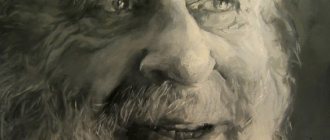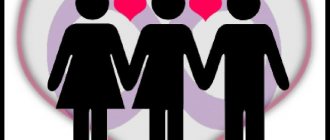“A blow to the heart, the first thought is a heart attack!”
Alexander, 28 years old, Rostov-on-Don:
I am a truck driver by profession. It all started when I lost my job. It was difficult to find a new one, and even relatives reproached me - in general, nerves after nerves. Finally, I found a part-time job, transported cargo to the Urals, and the car broke down there. I stayed on the highway for three days, in winter, alone, without money. He returned and began looking for work again. My wife and I had a car, we couldn’t afford to pay the loan, and the bailiffs took it away. Nerves again. I soon found a job, but on one of the flights I fell asleep at the wheel and had an accident.
After this, some kind of fear appeared, and a month later on the flight the first attack occurred. I was driving, talking to my wife on the phone and felt a blow to my heart, and my hands on the steering wheel felt strange. The first thought is a heart attack! Has stopped. It's dark, there's no one on the road. My head is spinning, it’s hard to breathe, cold sweat is flowing, my heart hurts. Thinking I was dying, I called an ambulance. Doctors later said that it was a nervous breakdown - just before this flight they blamed me for car repairs. The second attack happened another month later and again on the road. I began to choke, again hand tremors, nausea and a terrible fear of death. I returned home, began to study the literature, realized that I was having panic attacks and turned to a neurologist.
The world around me seemed unreal, at work I was removed from flights and transferred to a warehouse, and three months later they fired me, thinking that I was mentally ill
The doctor prescribed Phenibut. After that, life turned into hell. The attacks repeated several times a day. The world around me seemed unreal; I had the feeling that my mind existed separately from my body. I lived in constant wild fear. At work, I was removed from flights and transferred to a warehouse, and after three months they fired me, thinking that I was mentally ill. I sat at home and read about the attacks, because of this they intensified. I was scared to go out; I shied away from mannequins in the store. I lost the meaning of life and began to think about suicide. Meditation and a change of environment did not help me. Once again, while studying my parishes, I came across one video. There the guy told me that you need to stop constantly thinking about it and not read information about attacks - in short, forget about everything and accept it as it is, and then everything will pass. That's exactly what I did.
I found a new job, forced myself to drive, and the panic gradually began to go away. I slowly began to learn to live again. Now, sometimes, I’m driving, and it’s as if my hands are not mine or as if I’m falling out of my body, but I understand that nothing has happened to me in a year, and I let go. There are goals in life, but there is no joy. Relatives noticed that the smile had disappeared and the eyes had changed. Life was divided into before and after.
"I knew it"
Photo from dailymail.co.uk
It happens that a mother finds herself in a vicious circle of anxiety: she seems to be waiting for the next incident, and when this happens, she triumphantly says: “I knew it.”
It seems that the child is ready to respond to her expectations - as if he is deliberately throwing up all sorts of reasons for concern. What can you do here?
If the anxiety is situational - in response to some incident that happened to the mother or in her immediate environment, the child has nothing to do with it, the mother needs to work with a psychologist.
For example, the mother of a child with allergies once saw him have a severe attack, and now she is trying to protect the child in every possible way. A psychologist will help you understand what is behind these fears.
If anxiety is a character trait, everything is more complicated. Yes, sooner or later something will definitely happen, but you can approach it differently. Someone will say: it happens, but someone will take what happened as proof that they were right: “I told you so, I knew it!” And then the mother “needs” the anxiety, and she will not fight it.
What should you remember? Our anxiety can stop a child's initiative. If there is danger everywhere, he picks it up and begins to be afraid himself, and does not take the initiative.
Therefore, if even a small incident with the baby increases the mother’s feelings of guilt and anxiety, this is a reason to work with a psychologist.
For those who cannot yet do this, there is the sos-method , which was invented by the Viennese psychologist Viktor Frankl, who worked with obsessive states.
Frankl suggested bringing your fears and anxieties to the point of absurdity, not avoiding them, but, on the contrary, immersing yourself in them as much as possible. At some point a fracture will occur and the tension will decrease.
“Having learned the fear of death, I became closer to God”
Alina, 24 years old, Prokopyevsk:
Until I got married, I grew up with my grandmother. Before her death, she constantly complained: “Oh, my head is spinning, I’m walking like I’m drunk,” and said that she would die soon.
My husband sometimes drinks, and we fight because of it. After one of the quarrels, I had the same feelings, and, remembering my grandmother, I thought that I would die too. This thought stuck in my head. Also, the fortune teller my mother-in-law turned to predicted that I would commit suicide and gave me up. It's not easy to live with these thoughts.
I started to develop hypochondria and began to invent illnesses for myself. I didn’t have the money to get around the doctors, so the situation only got worse: panic attacks began. It was very scary, I cried my eyes out and thought I was dying. After that, I went to a psychiatrist, who prescribed me a cocktail of antidepressants and tranquilizers.
I used to yell at every quarrel that I didn’t want to live, that I was tired, and now I’m probably reaping the fruits of my words
My husband said that I had read a lot of things and convinced myself of them. The mother said that it was all from fatigue - after all, there were two children. The doctor said that I was normal, I was just depressed. I was afraid that I would go crazy and hurt someone, I was afraid of death. Then I began to understand that I had to watch my breathing and it would soon go away. Six months later, I voluntarily stopped taking medications, since many people believe that you need to change your thinking and look for the cause in your head, and not eliminate anxiety and panic attacks with pills.
Having learned the fear of death, I became closer to God and began to appreciate everything I have. Previously, at every quarrel, I yelled that I didn’t want to live, that I was tired, and now, I’m probably reaping the fruits of my words. Never complain about your life or blame anyone. You are the masters of your own destiny. Live and enjoy every day you live. Such a test, I believe, is given to make a person realize the value of life.
Now panic attacks happen three times a month, but previously every day. There is still depression, but I am treating it.
“There is always a variable X that does not depend on me”
Photo from theswaddle.com
There is nothing wrong with fear itself, as long as it works the way nature intended. In control too, if it is not hypertrophied.
Each of our emotions has its own role. Anxiety and fear have a protective function; they warn us of danger. It's normal to feel them and then take steps to protect yourself.
A healthy mechanism is to be afraid of heights and move away from the edge of the abyss.
But when this ceases to be a protection, but becomes something that interferes, stops you, if it worsens the quality of life, and prevents you from doing your business, there is a reason to turn to a specialist.
But if anxiety or fears become obsessive, spin around in your head non-stop, you can’t sleep, you can’t let your child go for a long time - in a word, when they interfere with your life, this is not normal. Sometimes this can indicate depression.
You cannot “hide” your worries and fears from yourself. When we come up with instructions for ourselves and our children for all occasions in life, we try to foresee and predict everything, we are hiding our real emotions in a distant drawer.
It is more productive to interact with them openly. Tell yourself: yes, it is normal to feel worried about your child. Yes, at times I feel helpless, but this is also natural.
It is useful to draw in the form of a pie chart what depends on me and what does not depend on me. You need to focus on what you can do. I carry out my program, my area of responsibility, and the rest is as God willing. I just remember that there is always some variable x that does not depend on me.
“Parents still don’t believe it”
Alexandra, 27 years old, Kemerovo:
I have been living with panic attacks for 10 years. When it all just started, I sat in the apartment for about a year without leaving. Friends brought food and took out trash.
Sometimes there are no panic attacks for six months, sometimes they happen several times a day. The attacks last up to 10 minutes: arrhythmia, weak legs, shaking hands, dilated pupils, difficulty holding your head straight. I fall into a stupor and slowly understand. I haven’t found any pattern, no reasons: I’m overwhelmed with both acquaintances and strangers, both at home and at work. A panic attack is like being in front of a predator and having to fight or run. It’s impossible to control yourself at these moments. You just have to endure it.
A panic attack is like being in front of a predator and having to fight or run.
I saw a neurologist, a psychotherapist, lived in Israel for seven years, was treated there and am still being treated here. I am ashamed to live with this: you are both disabled and not disabled. The strong pills that I took in Israel are impossible to get in Russia without outpatient treatment. They told me: to get it, you have to stay in a mental hospital. I don’t consider myself mentally ill, so I don’t see the point in being hospitalized.
I lead an active lifestyle, I’ve been living with my boyfriend for two months. He hasn't noticed my attacks yet. I choose non-social activities and change jobs frequently.
My parents still don't believe that panic attacks are real. They say that I just invent problems for myself. Friends are understanding. I don't expect support. What to support? Well, we felt sorry for you, once, twice. You won't constantly bother with your problems. I cope on my own as best I can. You can live with this.
Reasons for fear of the dentist
To stop being afraid of the dentist, you must first understand the reasons that cause this fear. Such reasons include:
- vivid childhood memories when a visit to the dentist was accompanied by pain and the sounds of a drill;
- panic fear of just the sight of dental instruments;
- fear of feeling pain, fear of the sight of blood
These main reasons can be supplemented by indirect ones: people are afraid of medical errors and expensive treatment, afraid to show their teeth to an unknown person, and feel weak and helpless in the dental chair.
“I used to take care of myself, but now I wash my hair once a week.”
Yulia, 30 years old, Vladivostok:
I am a teacher by profession with 10 years of experience. I took a gap year where I worked somewhere other than teaching. The pace was frantic, I couldn’t keep up. And then the panic attacks started.
On November 16, 2021, I woke up as usual and started getting ready for work. Suddenly it came over me: I became wildly scared, my arms and legs went numb, I stopped feeling them, my body began to tremble, and my heart was pounding madly. I felt hot and cold and felt nauseous. This lasted half an hour. Then I felt very weak and lay there all day. I simply didn’t have the strength to go to work. I didn't understand what was happening to me. A few days later the attack repeated, then the attacks became daily and were repeated several times a day. I had to quit my job.
I visited all the doctors in the city, took a bunch of tests - everything was normal. As a result, the therapist said that I have vegetative-vascular dystonia. She advised me to go for a massage, acupuncture and drink valerian. It didn't help me. I even tried hypnosis. It happened that I didn’t sleep at night for a week - I was afraid not to wake up and only fell asleep in the morning.
I was afraid that I was going crazy or had already gone crazy, but I just didn’t know about it, so I went to a psychiatrist. I was diagnosed with generalized anxiety disorder. The psychiatrist prescribed me some nuclear antidepressants. I was simply afraid to drink them - I don’t want to become a vegetable. Moreover, antidepressants do not get rid of the problem, but only block it, and if you stop taking them, everything will come back again.
Once upon a time I was a lighter girl, but now, due to panic attacks and hypochondria, I can’t go to a club with friends
I decided to do an MRI of the brain. Everything was in order, but it started to bother me that time had passed since the first examinations, suddenly something appeared during this time, I needed to be examined. In general, I began to develop hypochondria. I went to the doctors again, they looked at me like I was a fool. I spent hours on the Internet, reading medical reference books and falling into hysterics. I didn’t go outside at all for three months. Later, from the Internet, I learned that these were panic attacks.
Now it’s a little easier for me: it covers me twice a week. I went back to work in May. I thought I’d return to my path and let her go. It didn't let go. Just the other day I had an attack. I went to the dining room to serve breakfast to the children and I started shaking, I wanted to run away somewhere. When an attack begins at work, I go to a deserted place, roar and call my friends and mother.
If something pricks me somewhere, a pimple pops out, I immediately start to panic. The attacks make life very difficult. I wanted to go to the dance, I even signed up for the group, but I didn’t go: at the last moment I became afraid that it would suddenly hit me there and I would make things worse for myself. I used to be a lighter girl, but now, due to panic attacks and hypochondria, I can’t go to a club with friends. I used to take great care of myself, but now I can wash my hair once a week. I understand that it shouldn't be this way, but I just don't have the strength. I don't know who to contact. We don’t have proper specialists in our city, and I’m skeptical about Skype sessions. I will be looking for a psychiatrist again in the near future.
“No disorder will prevail over the real me”
Ekaterina, 21 years old, Moscow:
The first panic attack happened this winter when I went to a lecture on motion design. I invited my friends to come with me, but they were not interested. As a result, I found myself alone among strangers in a closed auditorium. As soon as the lights were turned off, my heart began to jump out of my chest, and my breathing became noticeably faster, I was short of air. Then I was sick with ARVI, so I didn’t attach much importance to the attack and wrote off my condition as a cold.
Over time, the attacks began to recur, but this time in transport.
I felt especially hard on the subway in the morning. I asked friends and family to go with me, it helped.
The attacks were repeated again and again. Everything got worse to such an extent that my every day turned into torture.
During the session, panic attacks became more frequent and repeated almost every day. I used to take a regular sedative. I thought it would help me, because I was just overtired, because I completed almost all the sessions with excellent marks. My boyfriend forbade me to smoke: he thought it was all because of cigarettes. But the attacks did not stop, and I decided to go to the doctor. The local therapist said that these were panic attacks and prescribed magnesium, which, naturally, did not help, because these are just vitamins. My family was surprised by my diagnosis. Nobody took it seriously, not even myself. I thought that this condition was temporary, I just needed to be patient, wait. But the attacks repeated again and again. Everything worsened to such an extent that my every day turned into torture. I turned to psychotherapists who prescribed me antidepressants. At first I refused to take them because of the side effects, but they convinced me that I couldn’t handle it on my own.
It’s easier for me than for many of those who experience panic attacks: I’m used to constantly communicating with people, it’s difficult for me to live a day without my friends. They constantly support me in difficult situations, although at first they made fun of my condition, saying that I simply communicated too much with melancholic people.
The last attack was a week ago. I've been taking antidepressants for three weeks now. No disorder will prevail over the real me - cheerful, active and positive. I didn’t stop studying and going for walks. If I paint myself into a corner and don’t get out of it, it will be much worse.
Andrey Zhilyaev, psychotherapist, head of the department of clinical, neuro- and pathopsychology, Institute of Psychology named after. Vygotsky Russian State University for the Humanities:
If you have a panic attack, the most effective non-drug means of combating it is dosed or controlled hypoxia. This method is usually shown in Western films: at the moment of an attack, the characters begin to breathe into a bag. At this moment, a compensating mechanism is activated in the brain - the anti-epileptic shaft - thus the affect at the level of the physical reaction ceases to dominate and the panic attack does not occur or is smoothed out.
Classic panic attacks are more common in women than in men. But, according to our forecasts, this gender advantage will smooth out in the near future.
For a panic attack to occur, two conditions are necessary: stress, usually chronic, and the presence of a weak point in the central nervous system - a microthromb, the consequences of a previous injury, and so on. But the decisive moment, as a rule, is stress.
If earlier panic attacks were considered a mental disorder, now they are considered as a psychoneurological pathology. She can be cured. Until recently, psychiatrists treated panic attacks only as stress, the equivalent of neurosis, and neurologists - as a vegetative crisis. Now we combine these treatment methods. Psychotropic therapy - the treatment of an exclusively mental disorder, which has been especially actively pursued in recent decades - led to chronicity and prolongation of the process. But if we are able to overcome the situation within the nervous system, then stress, while perhaps remaining a component of life, will not lead to panic attacks.
Vladimir Fainzilberg, associate professor at the Institute of Psychoanalysis, member of the European and Russian Professional Psychotherapeutic League:
Panic attacks are the most common neurotic disorder. Objectively, according to all medical indicators, a person feels good, but subjectively - absolutely terrible. Patients can be divided into two groups: neurotics, in whom any minor life collisions cause panic reactions, and those in whom panic attacks occur after experiencing shock.
It is possible to cure this disorder. Most often, at the initial stage of the disease, patients need medication support. This way, the patient quickly feels that the treatment is having an effect, and begins to believe in himself. The theory that when you start taking antidepressants, attacks initially become more frequent is incorrect. The right combination of antidepressants and tranquilizers leads to noticeable improvements from the first days of use. But if a person is predisposed to panic attacks, without psychoprophylaxis - auto-training or sessions with a psychologist - any stressful situation will lead to a new attack.
If you have a panic attack, you need to calm yourself down and understand that everything is fine with your body, all fears are only in your head. Deep slow breathing is also recommended. Then, of course, you need to visit a psychotherapist, who will determine whether you need medication help.
Neurosis out of the blue
Dermatitis, nightmares, nervous tics - all this is a hidden conflict that has turned into somatics; it is pointless to treat the symptom, we must look for the root of the conflict
How to stop being afraid of the dentist
Dealing with the fear of visiting the dental clinic is both simple and complex. It’s simple because, having identified the main cause of fear, it’s twice as easy to stop being afraid of the dentist. It is difficult because it requires willpower and self-improvement on the part of the person himself.
Thus, all patients of our Dentistry on Shchelkovskaya (not far from the Shchelkovskaya metro station) are always aware of what and how they will be treated before starting treatment. The dentist talks about painkillers, technologies that do not injure teeth, as was the case before, about filling materials that last for decades with proper care.
Our patients are always aware of the cost of treatment and discuss the possibility of installment payment with the doctor. Light, pleasant music plays in our offices, you will be completely calm and the treatment will take place without complications, fear and pain.
Take the first step towards defeating dental phobia, make an appointment with a dentist by calling 8 (495) 033-00-63 or using the online appointment form.
To stop being afraid of the dentist, you need to familiarize yourself with the state of modern dental science. This is a very effective technique - to find out in detail what scares you. Then a visit to the doctor will no longer seem threatening and scary.
First, familiarize yourself with the products that dentists use today for local anesthesia. They begin to act almost immediately and completely dull the pain. Even if there is surgery, you will not feel it.
Secondly, the range of medicines and materials that are used in dentistry today has expanded significantly. Today, it is absolutely safe to relieve any pain from treatment of teeth and gums - the doctor himself will prescribe the drug you need. For filling and dental treatment, modern materials are used, which are not rough, like the old ones, but safe and comfortable.
The greatest fear of the dentist among patients is caused by procedures performed in the dental cavity. It is they who are associated in people’s minds with the terrible sound of a drill, with sharp and uncomfortable instruments. In fact, things are completely different in dentistry today. Drills are no longer so noisy, and instruments are constantly being improved and modernized. Throw away the stereotypes of ten years ago and feel free to make an appointment with the dentist.











